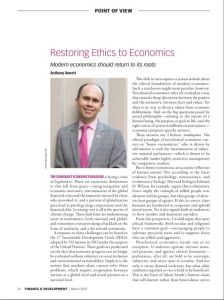
Anthony Annett
Restoring Ethics to Economics
Modern Economics Should Return to Its Roots
IMF, 2018
What's inside?
Economics needs to re-engage with moral philosophy to remain viable in the 21st century.
Recommendation
According to policy expert Anthony Annett, economics needs to return to its origins in moral philosophy to regain its validity in the 21st century. In this insightful appeal, he argues that the prevailing neoclassical doctrine encourages reckless behaviors, such as those that led to climate change and to the 2008 global financial crisis. He posits that economics must consider the social and environmental costs of economic activities. getAbstract recommends Annett’s well-presented and compelling case to government and business leaders as well as to economists.
Take-Aways
- Many people today question the neoclassical assumption of “homo economicus” – the idea that individuals focus strictly on maximizing their material outcomes within free and competitive markets.
- Developments such as income inequality and the effects of globalization, among others, expose the hollowness of this neoclassical economic premise.
- The fields of evolution and psychology find that human nature is concerned with the social good, contrary to the neoclassical description.
- Most systems of ethics – whether religious or not – impel people to act for the benefit of others.
- The United Nations’ Sustainable Development Goals require that economic development programs include “social inclusion” and “environmental sustainability” objectives, to help bring broader ethics back into mainstream economic thinking.
Summary
Many people today question the neoclassical economic assumption of “homo economicus” – the idea that individuals focus strictly on maximizing their material outcomes within free and competitive markets. Developments such as income inequality, the effects of globalization, the fallout from the global financial crisis and the environmental impacts of climate change are converging to expose the hollowness of this premise. Applying this neoclassical doctrine has reduced trust in institutions and fueled an accompanying rise in nationalism and extremism.
“The dominant economic paradigm is facing a crisis of legitimacy.”
Moreover, homo economicus is a questionable portrayal of human nature. Recent studies in evolution find that, while selfish people tend to do better than more socially conscious individuals within a group, organized groups of altruists outperform those of individualists. Human beings are inclined to ostracize outsiders while favoring their own, but social group identity boundaries can extend beyond national or regional borders to encompass the globe. And most systems of ethics – whether religious or not – impel people to act for the good of others.
“We need a commitment to the common good as a moral boundary on the market economy.”
Findings from psychology indicate that human happiness derives from more than material wealth; social bonds, generosity and integrity are critical components. The narrow neoclassical economic view has created an “ethical blind spot” in the neglect of the common good – that is, the benefits to all that arise from shared efforts.
“We must restore ethical reflection to the heart of economic reasoning, recenter policymaking on the common good, and re-embed ethical education in economics and business education.”
Universal morals need to check the market economy to circumvent the harmful effects of people acting solely on material incentives. A worldwide commitment to cooperative economic activities is one way to care for the global common good without neglecting individuals’ needs at a national level. Delineated objectives in initiatives can also spell out the responsibilities of rich countries toward the developing world. For instance, in recognition of the continuing shock waves from neoclassical economic policies, the United Nations came up with 17 Sustainable Development Goals that 193 countries adopted in 2015. The goals require that economic development programs include “social inclusion” and “environmental sustainability” objectives, thereby helping to bring broader ethics back into mainstream economic thinking.
About the Author
Anthony Annett is an assistant to the director of the IMF’s Communications Department.
This document is restricted to personal use only.
My Highlights
Did you like this summary?
Read the articleThis summary has been shared with you by getAbstract.
We find, rate and summarize relevant knowledge to help people make better decisions in business and in their private lives.
Already a customer? Log in here.

















Comment on this summary